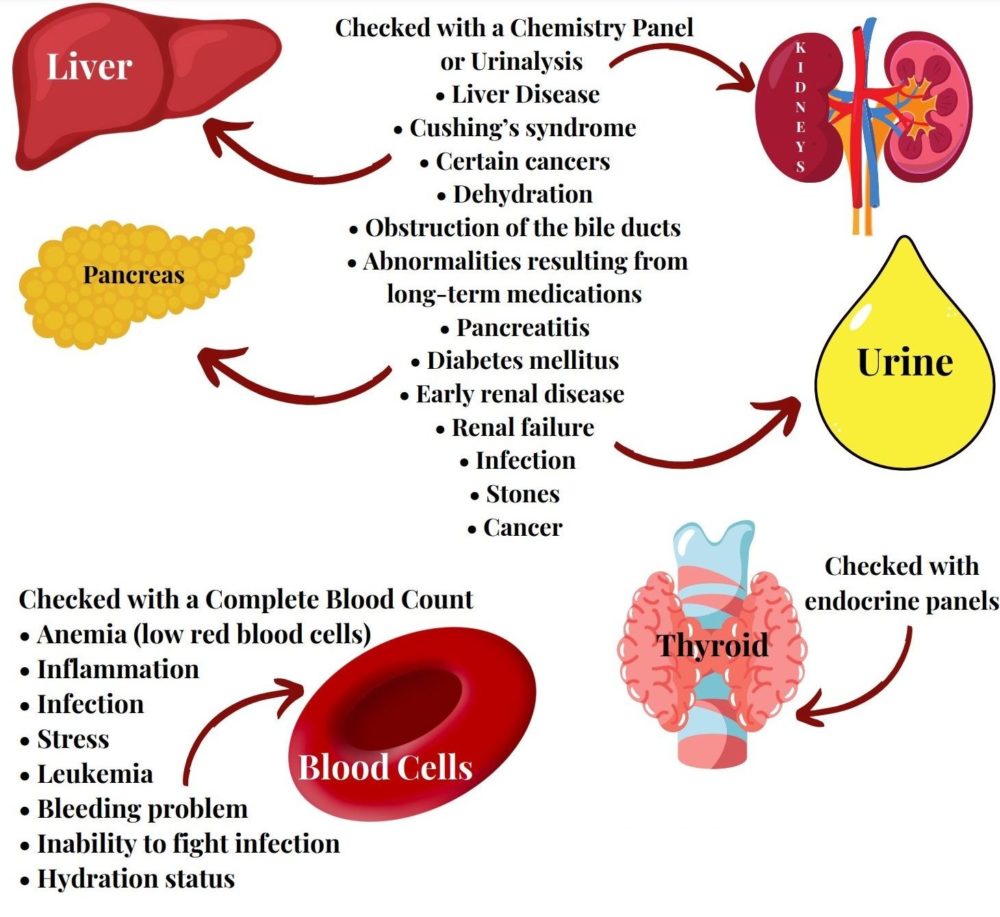Our Wellness for Life Packages offer pet owners a more affordable option for their pet’s annual diagnostic workups and diagnostic needs throughout the year. By being a part of these programs, your pet becomes a member of our Preventative Paw Pals Team and, as such, will receive discounts on their bloodwork, radiographs, ultrasounds, annual parasite preventions, and any surgical or dental procedures. When you sign your pet up for the Wellness for Life package at the time of their annual or within 30 days of signing up your pet will automatically receive additional discounts on certain diagnostic imaging, surgical procedures, and preventative products. Ask us about these programs at your pet’s next appointment.
Why does your pet need bloodwork?
Unlike humans, cats and dogs cannot speak to tell us how they are feeling or if something is changing in their bodies. Your pet relies on you to advocate for their health and for us, your veterinary team, to provide the best recommendations to fit their medical needs. Every pet’s needs are different based on multiple factors such as breed, age, and previous medical history, to name a few. A nose-to-tail, ears-to-toes physical exam, and diagnostics such as bloodwork, urinalysis, and imaging give us a more complete understanding of your pet’s current health.
When do we recommend bloodwork?
- Preventative Screening:
At a minimum annual bloodwork is recommended for all pets in order to establish their “normal baseline.” This allows your veterinarian to compare your pet’s internal values yearly and note any early changes before your furry friend exhibits organ disease or organ failure symptoms. - Illness and Emergency:
It also gives your veterinarian a baseline for your pet to refer to in times of illness. When a pet presents to the hospital exhibiting signs of illness, bloodwork is one of the many diagnostic tools available to use. If your pet
had bloodwork done with their annual when they were healthy, then we can compare their bloodwork at the illness appointment to the baseline and find any abnormalities or changes. - Preanesthetic check:
Bloodwork is also used to determine if a pet is healthy enough to undergo general anesthesia for surgical procedures. - Medication Monitoring:
The final use for bloodwork is to monitor internal values that medication could affect. Some of these effects are intentional, as we may be trying to lower or supplement a chemistry value or hormone value within the body.
What test might we recommend?
Below we have listed the most common diagnostic
tests that your veterinarian may recommend and
what values they check:
- Complete Blood Count:
This is also commonly referred to as a CBC. A CBC tells you if your pet has an infection, if inflammation is present, or if your pet is anemic. It also indicates hydration status. - Complete Blood Chemistry Panel:
This test checks your pet’s electrolytes and provides information about your pet’s liver, kidneys, and pancreas, as well as other functions of the body, such as blood sugar and hydration status. - Urinalysis:
This identifies if there is any infection or inflammation present in the urinary tract. It also informs us how well the kidneys are performing based on the urine produced. - Thyroid Function:
This is also known as a T4. It detects whether or not your pet’s thyroid gland is functioning properly, in some patients, it is producing too much and in others, it produces too little. Thyroid disease is more common among older pets.
These are the most common diagnostic panels however; some pets will benefit from more indepth testing at the recommendation of the veterinarian.
What does it mean?
Did you know your pet will not show signs of organ disease until they have entered the beginning stages of organ failure? Our pets do not show physical signs of kidney or liver disease until the organ in question has 70% damage present. Preventative testing allows your veterinarian to discover underlying disease EARLY, thus providing sooner intervention and, ultimately, a longer life for your pet. The additional benefit to treating internal disease processes early on is that it can make the cost associated with treatment more manageable

